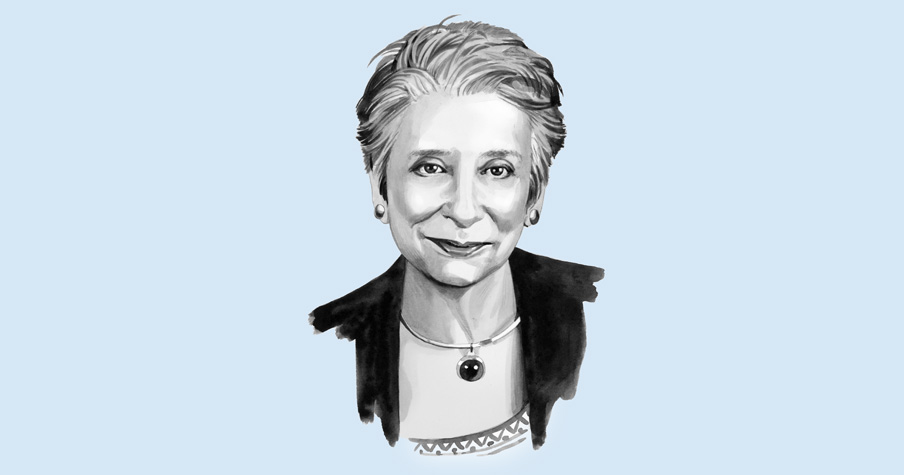
Portrait by Joe Mckendry
Barbara wheeler was an astute observer, an intellectual leader, a strong-willed advocate, and in all ways, a Christian. When she died in October many of us lost a colleague, a mentor, and advisor. She has been remembered eloquently in an obituary written by her friend and research colleague, Elizabeth Lynn; recalled winsomely to theological educators by ATS executive director Frank Yamada; noted faithfully to her denomination in the Presbyterian Outlook; and eulogized thoughtfully by Auburn Theological Seminary, where she served as president for 30 years. What she did has been well-recorded, but who she was in the midst of her amazing contributions also merits mention. Barbara was my colleague and friend, and I want to tell you about her as my friend.
I first met Barbara in the late 1970s. She had invited representatives from several seminaries to a conference to report on their school’s efforts on evaluation, and because institutional evaluation of any kind in theological education was in its infancy, it was a much-needed event. Barbara spent a career investigating and explicating what the schools needed, sometimes before they were aware they needed it. She taught more than one generation of theological educators about the issues they were facing, and how they might wisely respond to those issues.
I had training in evaluation, but Barbara was self-taught on this subject, as she was on many of the skills she used in her work – ethnographic research, survey research, data analysis, qualitative research – all of which she employed skillfully and professionally. She spent decades using these skills to help theological educators move away from their tendency to define reality by familiar anecdotes toward data-informed understanding. Because theological educators often had limited capacity to use data, Barbara invested considerable effort in making findings accessible and easily understood.
In the late 1980s, Barbara turned her attention to a question about how the culture of a theological school might influence its educational impact. She found funding and recruited a team of three researchers to work with her in an ethnographic study of two theological schools. We spent three years collecting data and another three discerning meanings and writing a book about culture as a pedagogical agent. This project could not have been completed without a team of researchers, but even when a team was not needed to complete the work, Barbara never worked alone. She was committed intellectually and personally to working with companions. Companionship for her never required agreement – it often seemed to flourish most in disagreement – but it did require careful thought and disciplined work. Barbara never, ever had patience with shoddy work.
She was committed intellectually and personally to working with companions. Companionship for her never required agreement – it often seemed to flourish most in disagreement – but it did require careful thought and disciplined work. Barbara never, ever had patience with shoddy work.
This study also educated Barbara about evangelical Protestants. She already knew mainline Protestants and Roman Catholics, and her interests typically led her to anything that she did not know deeply. Her education in evangelicalism continued as she and I participated in a study of the aims and purposes of evangelical theological education – Barbara as the only mainline Protestant and I as a representative of the ATS staff. The other participants were all well-respected evangelical scholars. Barbara’s presence influenced those discussions, perhaps more than any other single participant, and the discussions over several years were better because of her contributions. At the conclusion of this project, these evangelical scholars gave her a copy of the Women’s Study Bible in a Bible cozy – something they assumed her progressive Protestant friends had not done.
Barbara and Richard Mouw, then president at Fuller Theological Seminary, had been friends for many years. While they often agreed in their shared Reformed theology, they were on opposite sides regarding the ordination of gay and lesbian candidates for ministry. While most advocates in this struggle encamped into their own groups, Barbara and Rich participated together in a number of events in which he explained his position and she explained her opposing position. They modeled a kind of Christian engagement that was often absent in these discussions. Barbara’s strong opinions were a gift to good argument, and her sturdy faith provided hospitality for thoughtful opposition.
As ATS developed its leadership education events during the 2000s and 2010s, Barbara frequently presented the results of Auburn’s most recent research. One year, she reported on a study of seminary presidents that examined the skills good presidents needed for their work and the qualities of character that made that work effective. The study identified four personal characteristics exhibited by the best of the presidents: personal strength; a sense of humility; good interpersonal skills; and discipline. The study was not about Barbara, but these results described her very well.
This past summer, Barbara and I were working with staff at Lilly Endowment Inc. on some issues related to theological education. We talked by phone and Zoom with each other and with Lilly colleagues. These conversations occurred while she was undergoing serious medical treatment. Our conversations made it seem as if nothing had changed since the late 1970s when we first worked together.
Then, everything changed. My friend of four decades died before the conversations could end. I am left with grief at her passing, gratitude for her contributions to theological education, and thanksgiving for her colleagueship through all these years. Certainly, many others share these feelings.